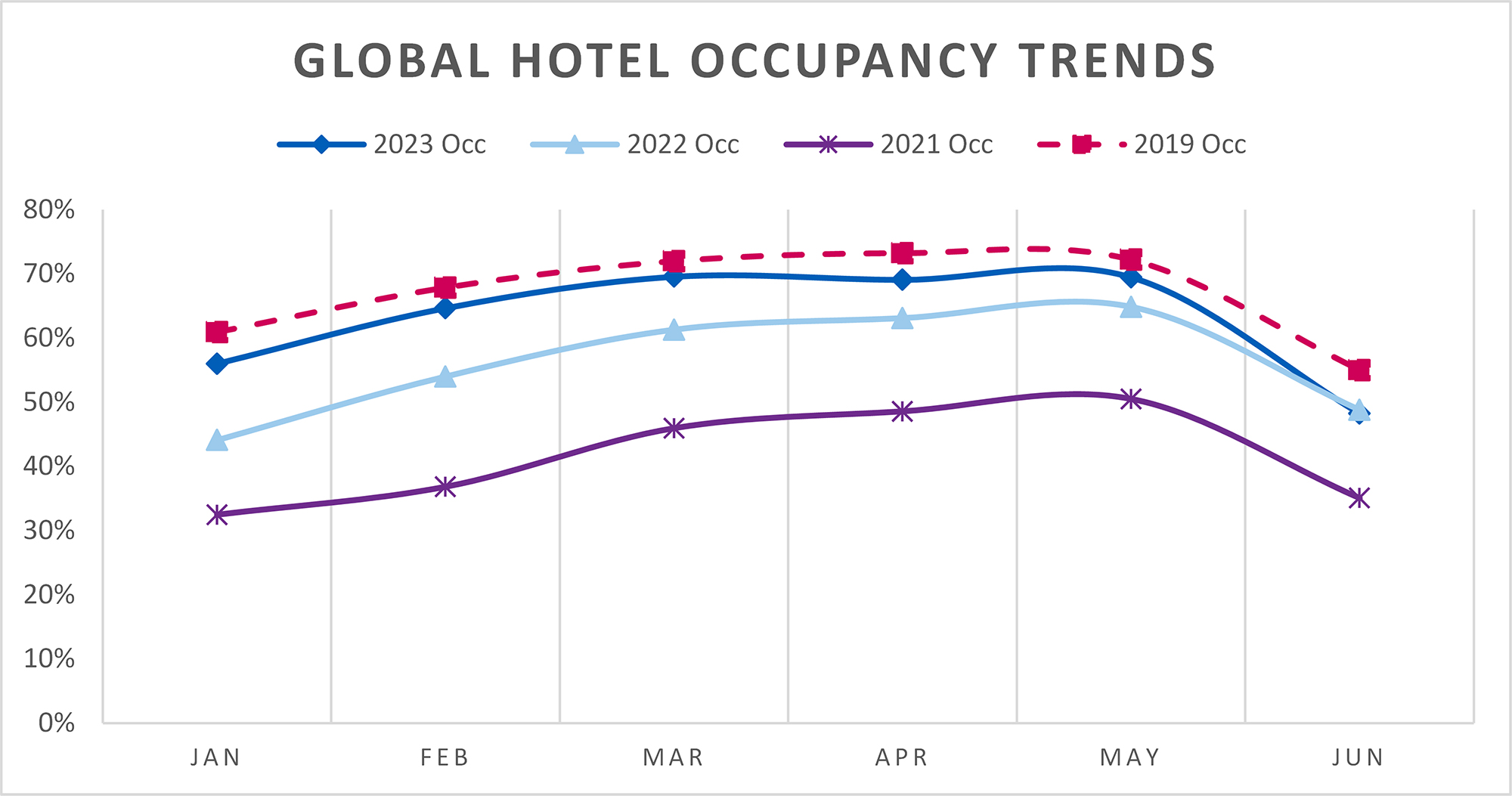
Originally published to PhocusWire
Exploring today’s traveler expectations as catalysts for change and how the hospitality industry can adapt in the coming years to deliver more seamless journeys
Data paints a positive picture for the year ahead in the global hospitality market. With continued demand for leisure travel and the reopening of China to tourism after several years, global hotel occupancy is on the upswing in 2023, with many markets surpassing pre-pandemic occupancy levels according to Amadeus Demand360® data.

Source: Amadeus Demand360® data as of June 1, 2023
Yet it’s important to acknowledge just how much things have changed – the hospitality industry of 2023 is not that of 2019.
The pandemic will continue to reverberate, reshaping the industry and traveler preferences in ways that would have been impossible to predict just three years ago. New Amadeus research shows today’s consumers have high expectations and want more personalized, flexible, and sustainable journeys. They want promotions and offers tailored for them, a wide range of accommodation options to choose from, and technology to enhance and remove friction from their trips.
How can hospitality organizations best adapt to accommodate long traveler wish lists and evolving tastes? At Amadeus, we believe it’s through an ecosystem approach, combining content and insights across hotels, mobility, and travel protection. This will enable the most comprehensive set of content to be available to travel sellers to drive sales and for travel providers to maximize revenue – with the traveler set to benefit. Here’s how.
Building connected journeys – change is coming
Travel sellers are a vital link between travelers on one side and travel providers on the other. When travelers choose to work with agents, they expect to receive high quality offers tailored for their budget, purpose, group size, time frame, and desired destination. In order to meet client expectations, travel sellers are searching for the widest range of content possible. Sellers are increasingly relying on data to explore booking, pricing, and occupancy trends, as well as tools to help them maximize productivity – for example, allowing travelers to see all bookings for an entire trip in one place. By making the travel experience easier for their clients, sellers can increase satisfaction and revenue, and drive return business.
As travel sellers adapt to new ways of working to support traveler needs, so too are hotels, mobility, and insurance providers. Known for being historically fragmented with “traditional” offerings, these sectors are now poised for rapid growth as they rethink their business models to unlock new opportunities.
Car rental companies are increasingly looking to modernize their practices – introducing technology to replace time consuming paper check-in forms, old-fashioned key fobs, and lengthy queues at rental locations. With sustainability also becoming a high priority for travelers, the sector is responding by offering information on the carbon emissions of each booking using dynamic data.
Multimodality is another significant growth area for the mobility space as travelers want all transportation options at their fingertips. The latest innovations go beyond car rentals to offer bookable ride-shares, electric scooters and bikes, ferries, helicopters, and other on-demand services. A recent study commissioned by Amadeus estimates multimodality could add 500 million travelers and €30 billion in additional revenue in Europe alone through 2030.
To provide peace of mind in an industry that carries a measure of uncertainty, travelers are also keen to add travel protection to their trip. They want relevant products and services offered to them that plainly explain what is covered. Clear, concise policies are gradually replacing lengthy documents few read, leaving travelers with no doubts on where they stand. Some insurance providers are even taking their support up a notch to offer interactivity during the trip. In the event of a disruption, a claim can be automatically launched and virtual cards offered to the traveler to remove stress from the situation.
Similar to mobility, insurance is another area of hospitality no longer considered “one size fits all.” Insurers can now use a range of metrics – including day of the week, booking class, season, group size, destination airport, and more – to create a unique offer to a traveler, one calibrated to meet their specific needs. Flexibility is key as providers work to cater to last-minute changes and new offerings beyond basic air travel insurance to coverage for hotel and car reservations, illness, weather related delays, even ‘cancel for any reason’ policies.
Finally, hoteliers face strong headwinds in meeting the changing needs of travelers throughout their journey – whether it’s the pre-arrival phase, on property, or post-stay. In order to capture the attention of travelers and travel sellers alike, they are doubling down on their demand generation efforts to avoid being outperformed by their competitive set. Hoteliers are taking a close look at their technology stack – moving away from standalone solutions to integrated offerings that can help them improve sustainability, revenue and marketing strategies, optimize their presence across distribution channels, and enhance onsite operations – both for housekeeping and event staff, as well as for the traveler through exciting digital enhancements.
Whether it’s corporate, leisure, or group travel, guests want the option to experiment with a hotel’s cutting edge technology – app-based room keys, mobile payments, voice on-command technology, contactless room service, and more. These digital experiences not only surprise and delight but deliver memorable stays as they replicate the comforts of home for many.
Clear demands for change can be heard across the hospitality industry in the post-pandemic era, and companies are rapidly stepping up their response. From travel sellers to travel providers, businesses are abandoning historical practices in favor of providing seamless, flexible, and personalized offerings with the traveler in mind. They are increasingly adopting sustainable practices, offering digital experiences, and looking to maximize productivity through the latest technological advancements.
It will take collaboration from many players to bring the experiences of tomorrow to life. But integrating hotels with travel protection and mobility in the short term will allow the sector to create new experiences and deliver the best possible service to our shared customers.
For more information on today’s traveler preferences and strategies to adapt, download our latest research – Catalysts for Change.





